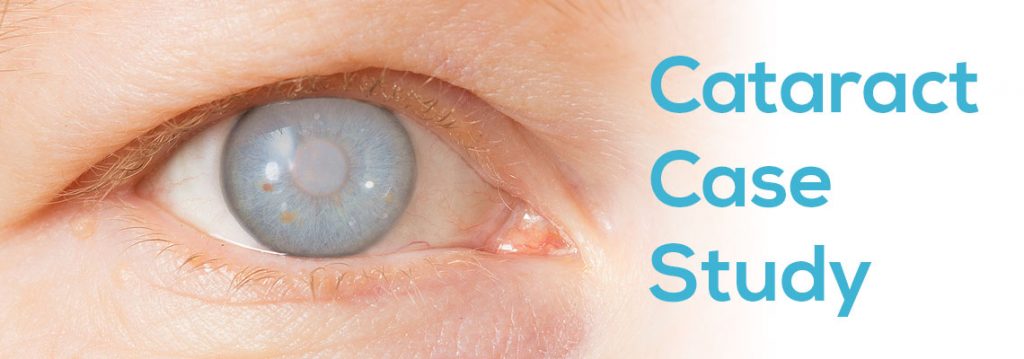Ask cataract patient Irene when she first became aware that her vision had changed for the better and she doesn’t have to think long.
“I remember that I was sitting in the garden – this would have been about two days after surgery – when I happened to notice a box of grass seed at the other end of the table,” she recalls.
“And all of a sudden I thought, ‘My God – I can read everything on the packet! Without picking up my glasses!’ It was absolutely amazing.”
Irene, 69 – a retired care assistant who grew up in Britain but now lives in Australia – had used reading glasses for long-sightedness for a number of years, but a routine eye check-up three years ago indicated there was another problem on the horizon.
“I was told I had the beginning of cataracts,” she explains. “Until that point I had no idea that I even had them – in the very early stages of cataracts you’re not necessarily aware of any changes.
“In fact I thought my vision was pretty good on the whole. I do a lot of craft work – knitting, sewing, painting – but I only had to put my glasses on for that and I could see everything normally.
“One thing I had begun to notice, though, was that my long-distance vision wasn’t as good as it used to be. I was beginning to struggle to read signposts. Or if a person I knew was standing at a distance, I would recognise their outline but I wouldn’t necessarily be able to see their facial features.
“I realise now that this was being caused by the cataracts. But at the time I wasn’t too concerned because I could still see OK. I guess I put fixing my cataracts in the ‘Too Hard’ basket and thought, ‘Well, I’ll cross that bridge when I really have to.’”
Things changed when Irene’s Hampshire-based daughter asked her to consider having the cataract surgery when she next visited the UK.
“This time we were staying in England for three months, so my daughter suggested I book an appointment with David for another check-up. And when he looked at my eyes, he said he was quite willing to do the surgery if I was willing to have it done.”
Cataract surgery works by replacing the eye’s natural lens, which has become clouded by the clumping of proteins within it, with a new artificial lens (called an intra-ocular lens, or IOL for short). The operation is usually performed with a local anaesthetic (though it can also be carried out under general anaesthetic, if necessary).
Having never had eye surgery before, Irene admits she felt a little daunted about the prospect of the operation.
“I was a bit apprehensive about it, to be honest. The IOL aspect wasn’t really what bothered me, because I trusted David. It was more that I felt nervous about having surgery full stop. I’m the sort of person who gets a bit het up about going to the doctor!
“But the good thing is that you can opt to take a mild sedative as well. Before you go into theatre, you’re given some anaesthetic eye drops to numb the area around the eyes, so that you don’t feel anything during the procedure.
“And then in my case the anaesthetist gave me a little sedative injection on top. He said it was equivalent to about three gin and tonics, which made me laugh. And he was absolutely right. I was so relaxed after I had it that I don’t really remember much about the surgery.
“And then before you know it, it’s over and done with. It took about 20 minutes for me to have the first eye done. I was able to go home after a few hours, and then I came back again a week later to have the other eye done. And by that point I felt a lot more confident about the operation.”
Recovery from cataract surgery is relatively swift. “You wear an eye patch for the first 24 hours and take eye drops four times a day, but I found there was very little discomfort,” Irene explains – and it wasn’t long before she began to appreciate the transformation in her vision.
“I noticed it within two to three days of the operation, and it really was amazing. You know the line in the song that goes, ‘I can see clearly now…’? It was like that. And suddenly I realised that my vision hadn’t been quite as good as I’d thought before the operation.
“Now I can see perfectly at distance. I can even read the TV titles again when I change channels – I could never have seen those before without glasses.”
A few months on from surgery, Irene says she would happily recommend the procedure – and the service she received at Anderson Eye Care.
“From start to finish, the experience was excellent,” she says. “David and all the hospital staff were professional, but friendly and reassuring. I would recommend David and the Nuffield to anyone who needs their cataracts done.”
And if she had any advice for someone considering cataract surgery?
“I’d say just go for it,” she smiles. “You won’t know what you’re missing if you don’t have it. If you have the opportunity to have it done, you’d be crazy not to.”
If you’d like to know more about Cataract and Refractive Lens Exchange at Anderson Eye Care, there’s plenty of helpful information on our website. Click here for a guide to the procedure, and learn about the 9 biggest myths of cataract surgery in this blog post.
Medical Disclaimer
This article is for information purposes only and should not be considered medical advice. If you or any other person has a medical concern, you should consult with your health care provider or seek other professional medical treatment. Never disregard professional medical advice or delay in seeking it because of something that you have read on this blog, website or in any linked materials.





